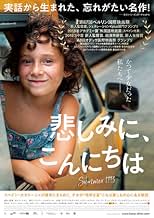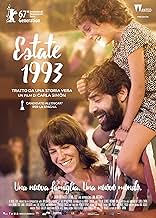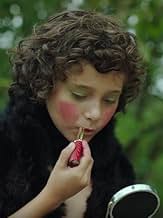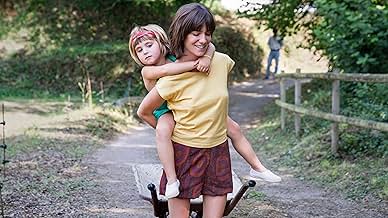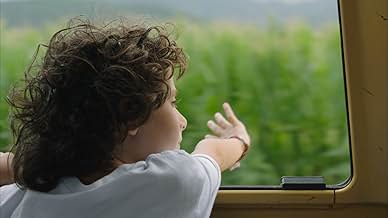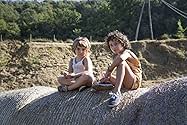IMDb RATING
7.1/10
8.8K
YOUR RATING
After her mother's death, six-year-old Frida is sent to her uncle's family to live with them in the countryside. But Frida finds it hard to forget her mother and adapt to her new life.After her mother's death, six-year-old Frida is sent to her uncle's family to live with them in the countryside. But Frida finds it hard to forget her mother and adapt to her new life.After her mother's death, six-year-old Frida is sent to her uncle's family to live with them in the countryside. But Frida finds it hard to forget her mother and adapt to her new life.
- Awards
- 38 wins & 58 nominations total
Paula Blanco Barnés
- Cesca
- (as Paula Blanco)
Dolores Fortis
- Carnissera
- (as Dolors Fortis Artacho)
Tere Solà
- Senyora Carnisseria
- (as Tere Solà Nasarre)
Josep Torrent
- Doctor
- (as Josep Torrent Alabau)
Cristina Matas
- Infermera
- (as Cristina Matas Calvet)
- Director
- Writer
- All cast & crew
- Production, box office & more at IMDbPro
Featured reviews
In the wake of tragedy it's pretty impossible to try and move on and forget your loss, imagine doing that if you were six years old and had no immediate family left. That's the story of Summer 1993, as a young Frida spends a summer in countryside Spain with her Aunt as assimilation becomes a grand task for a grieving young one. Both subtly heartbreaking and beautiful, Summer 1993 finds a unique voice with a young girl (semi-autobiographical from director Carla Simon) as she navigates a new life that will either break her or make her stronger.
7.1/10
7.1/10
This is a visual narration of the child's mentality on family, loss, life, game and death.
I mostly loved that the movie avoids making audience put in a ultra-sensitive position. The movie tells its story by gently touching our emotions although it is very easy to fall into trap of agitation, with a naturally sorrowful story.
This is the story of a little girl from Barcelona who is adopted by her aunt's family in the countryside, after her mother passes away. Largely autobiographical, "Summer 1993" is filmed in a very naturalistic style and almost feels like a documentary. The director, Carla Simón, pays special attention to the kind of small details that can make a big difference to a young kid. Although not very much seems to be going on in the surface, one can see that a very important drama, charged with intense emotions, is going on deep in the lives of this little person and the family that has welcomed her. The acting is all very effective and particularly Laia Artigas, who plays the main character, is surprisingly strong and charismatic for someone her age.
"Summer 1993" is one of many Spanish films that observe the world through the eyes of a child. Other examples include the classics "Cría Cuervos", "The Spirit of the Beehive" and "El Sur". The contemplative gaze and relatively slow pace remind me of "En Construcción", a documentary by another Catalan filmmaker, José Luis Guerín.
"Summer 1993" is one of many Spanish films that observe the world through the eyes of a child. Other examples include the classics "Cría Cuervos", "The Spirit of the Beehive" and "El Sur". The contemplative gaze and relatively slow pace remind me of "En Construcción", a documentary by another Catalan filmmaker, José Luis Guerín.
Carla Simon's well-observed tale of a young girl who's orphaned and forced to move into her uncle's home. Frida (Laia Artigas ) is the girl and her uncle Esteve (David Verdaguer) has a wife Marga (Bruna Cusi) and an even younger daughter Anna (Paula Robles).
Frida's mother's passing of an "illness" isn't defined at the outset, but, the constant medical tests the young girl has to be subjected to and the panic that ensues when she bleeds on a playground give you a pretty good idea of what will be revealed (not to mention setting it 25 years ago). But, SUMMER 1993 isn't really about that topic, it's more about coping without parents, and trying to blend in with her uncle's family. It's often awkward, and even painful, but it's never less than perceptive even if it never quite reaches the next level. The movie's path never seems in doubt, no matter the obstacles put in the characters' way. The music selections are interesting and unexpected with touches of soulful jazz. The ending concludes on a different note than one might forsee - but, it's just about right.
This was Spain's official submission for the Foreign Language Oscar last year (it was not nominated or short-listed).
Frida's mother's passing of an "illness" isn't defined at the outset, but, the constant medical tests the young girl has to be subjected to and the panic that ensues when she bleeds on a playground give you a pretty good idea of what will be revealed (not to mention setting it 25 years ago). But, SUMMER 1993 isn't really about that topic, it's more about coping without parents, and trying to blend in with her uncle's family. It's often awkward, and even painful, but it's never less than perceptive even if it never quite reaches the next level. The movie's path never seems in doubt, no matter the obstacles put in the characters' way. The music selections are interesting and unexpected with touches of soulful jazz. The ending concludes on a different note than one might forsee - but, it's just about right.
This was Spain's official submission for the Foreign Language Oscar last year (it was not nominated or short-listed).
It's really sad & not promising for humanity when people view a magnificent film like this & call it boring. It shows how our society, & especially school & the unconscionable entertainment industry, cater to the lowest levels of human nature, ignoring the pain, the love, & the good that we have but often don't know how to share or express.
Films like this can provide a genuine education at any level, with teachers serving as discussion leaders to help children express their pain, deal with their fears, & learn to appreciate one another while dealing with their differences & becoming supportive rather than competing, dominating, or constantly defeating one another as the morally bankrupt western civilization teaches them now.
Films like this can provide a genuine education at any level, with teachers serving as discussion leaders to help children express their pain, deal with their fears, & learn to appreciate one another while dealing with their differences & becoming supportive rather than competing, dominating, or constantly defeating one another as the morally bankrupt western civilization teaches them now.
Did you know
- TriviaLaia Artigas and Paula Robles were cast for Frida and Anna respectively because they displayed a power struggle relationship during the casting process.
- ConnectionsFeatures El retorno de D'Artacan (1990)
- SoundtracksToma mucha fruta
Written by Chop Suey (as Cesar Sala Garcia) and David Pallol Font
Performed by Bom Bom Chip
- How long is Summer 1993?Powered by Alexa
Details
Box office
- Budget
- €960,000 (estimated)
- Gross US & Canada
- $185,903
- Opening weekend US & Canada
- $21,307
- May 27, 2018
- Gross worldwide
- $3,031,379
- Runtime
- 1h 37m(97 min)
- Color
- Sound mix
- Aspect ratio
- 1.85 : 1
Contribute to this page
Suggest an edit or add missing content


